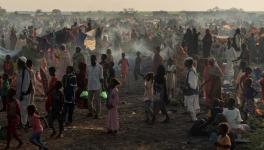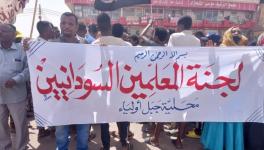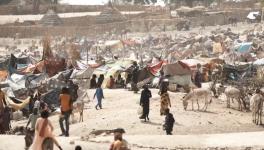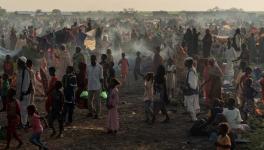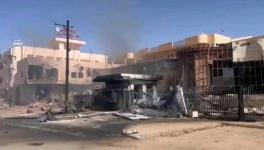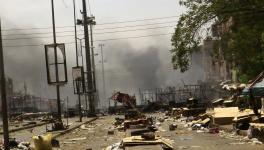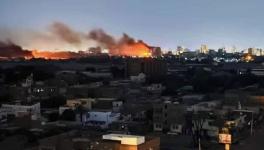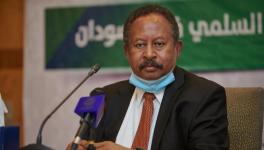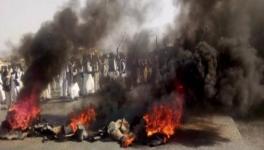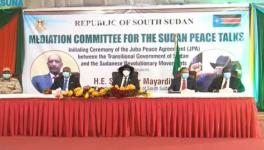Sudanese Transitional Govt. and Rebel Groups Sign Peace Deal
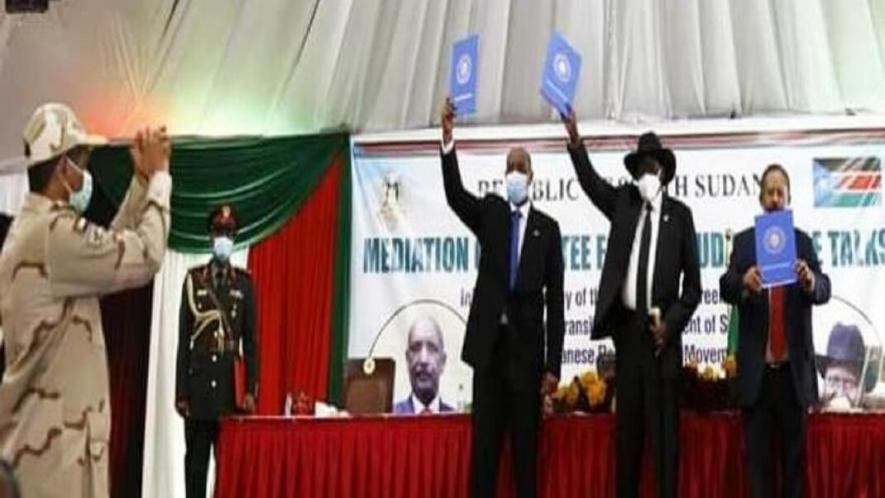
From the left, Sudan's President Al Burhan, South SUdan's President Salva Kiir, and Sudan's Prime Minister Abdalla Hamdok. Photo: RD correspondent
After almost a year of negotiations, Sudan’s transitional government and the armed rebel alliance, the Sudanese Revolutionary Front (SRF), signed the final peace deal on Saturday, October 3. The deal seeks to end the civil war which has been going on for decades in the regions of Darfur, Blue Nile and South Kordofan.
Held in South Sudan’s capital city, Juba, this signing ceremony puts the final seal on the agreement which was initialed by the two sides on August 31. It was attended by representatives of various countries, along with those from the African Union and the European Union. The deal covers the integration of rebel forces into the country’s security apparatus, the return of those displaced and a cabinet reshuffle.
Sudan Liberation Movement’s faction led by Minni Minnawi (SLM-MM), a Darfur rebel group which had withdrawn from the SRF in May, is also party to this deal. The SRF currently consists of the Sudan People Liberation Movement-North’s faction led by Mallik Agar (SPLMN- Agar), which has considerable power in the state of Blue Nile, along with four rebel groups in Darfur.
The agreement is not signed by SPLMN’s faction led by Abdelaziz El Hilu, SLM’s faction led by Abdelwahid Al Nur (SLM-AW), and eight other armed groups which have come together under the umbrella organization called the Armed Struggle Movements Coalition (ASMC).
ASMC has objected that this agreement is “incomplete and distorted”, leaving unaddressed the concerns raised by them. However, they have expressed willingness to negotiate for a comprehensive agreement.
As per this deal, the members of armed rebel groups will be integrated in the national army during a 39-month transition period which begins with the signing. The return of civilians from the lands they had been displaced from due to the conflict is to be facilitated. To protect the displaced and other civilian victims of war, a joint force consisting of 20,000 soldiers drawn from both the national army and the rebel groups is to be formed. Communities in the affected regions continue to be attacked by pro-government militias,
One of these conflict-affected zones, called the Two Areas, comprises the Blue Nile and South Kordofan States. This region will be granted self-rule during the transitional period.
The cabinet of the transitional government that currently administers Sudan will be reshuffled to accommodate five ministers from the rebel groups who have signed the deal. Sudan Tribune reported that three other representatives from these groups will get seats on the Sovereignty Council.
The Sovereignty Council is the highest body of the transitional government. In this council, power is equally shared by the military and civilian politicians representing the protest movement which overthrew former dictator Omar al-Bashir in 2019 and paved the way for the formation of the government.
The deal is also likely to hasten the setting up of the Transitional Legislative Council. This council is seen as being key in countering the power of the military in the current set-up. The formation of the council had been delayed until the peace deal, because the armed rebels wanted to negotiate their representation in it.
The guarantors to the deal were South Sudan, represented by a special envoy, UAE represented by its oil minister, Chad represented by its PM and the UN. Egypt, Saudi Arabia, the US and some European countries have signed as witnesses.
“Today’s agreement is not a deal to share power and wealth. Rather, it is a new page in the rise of the Sudanese people and the replacement of ammunition and weapons bills with production and development inputs,” said Sudan’s PM Abdalla Hamdok.
Recollecting the sacrifices made by the martyred civilians of the Sudanese revolution which deposed al-Bashir, and the rebel soldiers who had fought against his regime, SRF’s leader Al-Hadi Idris commented, “Now, your souls will rest in peace, as the cause for which you sacrificed has triumphed, and the peace that you seek has become a reality today.”
Following a meeting between the representatives of SRF and the government on October 4, Idris added that they discussed “several issues related to the arrival of the SRF leaders to Khartoum, the beginning of the implementation of the agreement and the inclusion of the peace agreement in the constitutional document in less than two weeks.”
Some groups hold back
Among the most prominent of the rebel groups which have not yet signed the agreement are SPLMN-al Hilu, which has control over parts of South Kordofan, and the SLM-AW, which has its strongholds in areas inside Central Darfur.
SPLMN-al Hilu demands the formal separation of state and religion, the lack of which, it believes, is at the root of the conflict in Sudan. The transitional government has deferred such a formal declaration to the constitutional conference, to be held after the peace deal.
The Declaration and Freedom and Change Forces (DFCF), the ruling civilian coalition of political parties which represents the protest movement, on October 4 reached an agreement with SPLMN-al Hilu to form a four-member body.
With two representatives from each, this body will work to arrive at a common understanding regarding this issue to resolve the latter’s concern and pave the way for it to be a party to the peace agreement.
DFCF’s central committee member, Ibrahim al-Sheikh, also said that his coalition will reach out to the leader of the SLM’s faction led by Abdel Wahid al-Nur, which controls areas in Central Darfur.
This group has refused to engage in the peace talks until attacks in Darfur by pro-government militia forces are brought to a stop, and concrete measures are taken to ensure the security of the civilians in the region.
Courtesy: Peoples Dispatch
Get the latest reports & analysis with people's perspective on Protests, movements & deep analytical videos, discussions of the current affairs in your Telegram app. Subscribe to NewsClick's Telegram channel & get Real-Time updates on stories, as they get published on our website.









